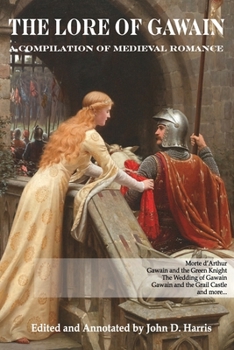The Lore of Gawain: A Compilation of Medieval Tales
The Lore of Gawain is quintessentially European-Latin, Irish, Welsh, English, French and German. He was Gwalchmei in Welsh; Gauvain in French, Walwein in Latin, Walewein in German. In the Irish, ultimately, he is Cuchullin-an incarnation of Lugh, the sun god.
Called the Father of Adventure, the Father of Courtesy, and the Good Knight, the "best knight in the world", Gawain was the premier knight of the Round Table, the original champion of Queen Guinevere and King Arthur's best and dearest and own kin. But he was not invincible nor without error nor without fault. He was not always the superlative warrior that he may be supposed. Neither was he always chivalrous. But if not perfect in prowess or courtesy, he was gifted in ways none other may be. For in any given day, at certain times, he was supernaturally strong; do not face him in the morning, avoid him until night falls; for he bears the potency of the sun itself. He heals all manner of wounds and ailments with uncanny instantaneous efficacy; he knows sacred lore that even Merlin knows. He is as literate as a scholar. He is eloquent and gracious. The lore of Gawain spans the time before time unto the sixteenth century and further unto more than one modern-era poet. By consensus it originates in the mystic realm of Fairy faith: f th f ada (the magic mist) and the Tuatha D Danann (the children of Diana) and Avalon (the Otherworld). Included with commentary are these principal classic texts: - Sir Gawain and the Green Knight - Le Morte d'Arthur - The Wedding of Sir Gawain & Dame Ragnelle - Sir Gawain and the Lady of Lys - - Castle Orguellous - Morien - Gawain and the Grail Castle - Parzival by W.olfram von Eschenbach -Format:Paperback
Language:English
ISBN:1792063830
ISBN13:9781792063831
Release Date:December 2018
Publisher:Independently Published
Length:540 Pages
Weight:1.73 lbs.
Dimensions:1.2" x 6.0" x 9.0"
Customer Reviews
0 rating





